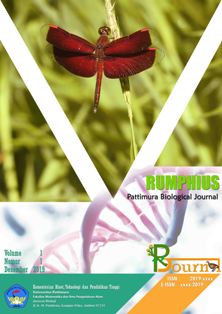IMPROVING BIOLOGICAL SCIENCE LEARNING OUTCOMES WITH USED A CONTEXTUAL-BASED INQUIRY APPROACH THE CONCEPT OF PHOTOSYNTHESIS IN CLASS VIII STUDENTS OF JUNIOR HIGH SCHOOL NEGERI 2 AMBON
Abstract
The inquiry approach is one of the approaches proposed by experts to be developed in the learning process. Where inquiry learning teaches students how to research problems or questions of facts. Learning used an inquiry approach requires a classroom environment where students feel free to create, make assumptions and draw conclusions. The aim of this research is to determine the improvement in biological science learning outcomes regarding the concept of photosynthesis used a contextual-based inquiry learning approach for class VIII3 students at Junior Hight School Negeri 2 Ambon. This type of research includes descriptive research using a PTK design. This research was conducted at a Junior High School Negeri 2 Ambon. The subjects in this research were students in class VIII3 as many as 26 students. Data analysis uses qualitative data, then the final value is converted using completeness criteria. Based on the tests gived in cycle I, the final test results for each group were not significant. In group I, only 4 students (15.4%) had not reached the completion criteria and 5 other students were able to achieve completion with a percentage (19.2%). The number of students who achieved completeness in group II was 7 students (27.0%), and 2 other students (7.7%) did not achieve completeness. Meanwhile in group III, there were 5 students who were able to achieve completeness with a percentage of (19.2%) and 3 students (11.5%) who did not achieve completeness. Thus, there were 9 students (34.6%) who had not achieved completeness and 17 students (65.4%) had achieved completeness. Meanwhile, in cycle II the test results increased. In group I, there were 5 students who met the completion criteria with a percentage of 19.2%, 4 other students still had not completed it. Group II increased even more, 7 students (27%) met the criteria for completion while 2 students (7.7%) still did not complete. In group III there were 5 students (19.2%) who met the criteria for completion, and 3 other students (11.5%) who still had not completed it. The final test seems to show very good results. The conclusion of the research was taught used a contextual-based inquiry approach to the concept of photosynthesis can improve student learning outcomes, seen in cycle I and cycle II because the cognitive, affective and psychomotor aspects can improved.
Downloads
References
AL-Kadiri, N. 2020. Students' Initial Abilities. (http://edukasi.kompasiana.com). Accessed, 14 September 2022.
Gendhotwukir. 2020. Active Listening. (http://gendhotwukir.multiply.com). Accessed, 2 October 2020.
Simpson, S. 2020. Learning science. Opening the Horizons of the Environment. Jakarta: Setia Purna Inves.
Kunandar. 2020. Professional Teachers and KTSP Implementation. Jakarta: Raja Grafindo Persada.
Kirawati. 2020. Classroom Action Research. 7th printing. Jakarta: Bumi Literacy.
Makmun, W. 2020. Teaching and Learning Strategies. Jakarta: Grasindo. Ibrahim, M. 2007. Inquiry Learning. (http://herfis.blogspot.com). Accessed, 29 September 2020.
Muchith, A. 2020. Laboratory Inquiry-Based Acid-Base Learning Model as a Vehicle for Science Education for Middle School Students. (on line). (http://www.p4tkipa.org).
Open University. 2020. Psychology of Teaching and Learning. (http://pustaka.ut.ac.id). Accessed, 23 September 2020.
Purnomo, S. 20020. Minimum Completeness Criteria. (http://sidikpurnomo.net). Accessed, 6 September 2020.
Riyanti, E. 2020. Biology Science. KTSP Content Standards. Surakarta: Teguh Karya.
Sudrajat, A. 2020. Affective (Attitude) Learning Model. (http://akhmadsudrajat.wordpress.com). Accessed, 22 September 2021.
Sumaji. 2020. Humanistic Science Education. Yogyakarta: Kanisius.
Sanjaya. 2020. Contextual Learning. 5th printing. Jakarta: Kencana.
Wenno, I. H. 2020. Contextually Based Science Teaching and Learning Strategy. Yogjakarta: Inti Media.
Wenno, I. H. 2020. Educational Research Design and Data Analysis Techniques. Yogyakarta: Indah Graphics.
Wiraatmadja, R. 2020. Classroom Action Research Methods. 5th printing. Bandung: Rosdakarya Youth.
Yoginato, E. 2020. Application of Classroom Action Research in Improving the Quality of Learning. MIPA. Volume 1 Number 2. Ambon: FKIP Unpatti.
Copyright (c) 2023 Ince Wattimury, Ine Arini, Alwi Smith

This work is licensed under a Creative Commons Attribution-NonCommercial-ShareAlike 4.0 International License.
Authors who propose a manuscript and have it approved for publication know that the manuscript will be registered and become part of the RPBJ. Authors and readers understand that this journal is open and all its contents can be accessed freely, provided that RPBJ is still listed as the source of information. The hope is that this journal can become a vehicle for exchange and scientific knowledge for society and the scientific community, especially in the field of Biology and other branches of science.









